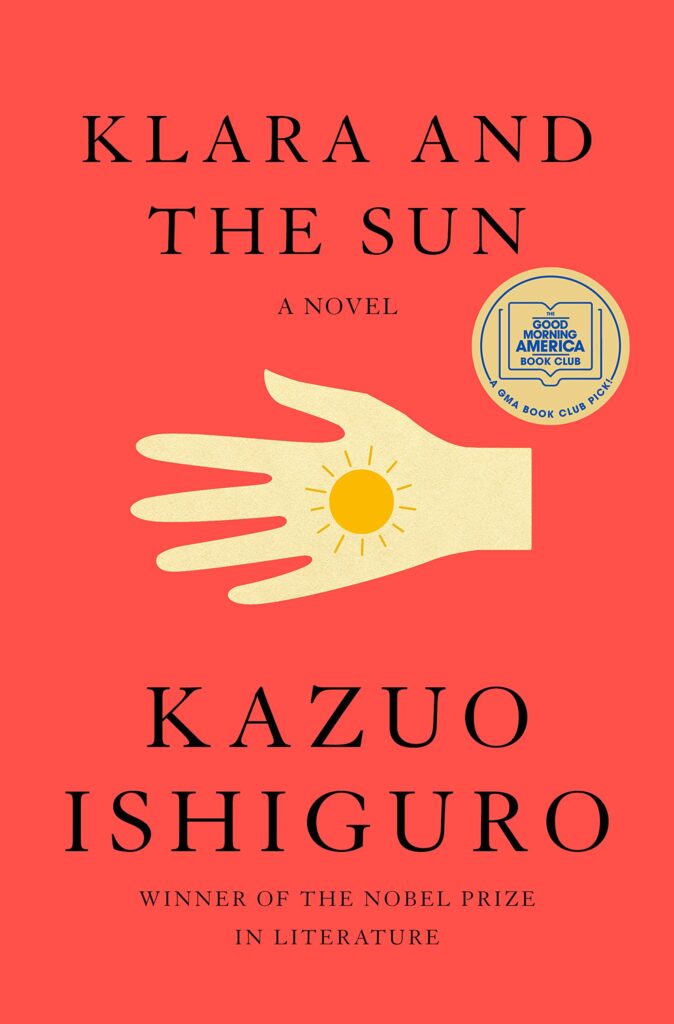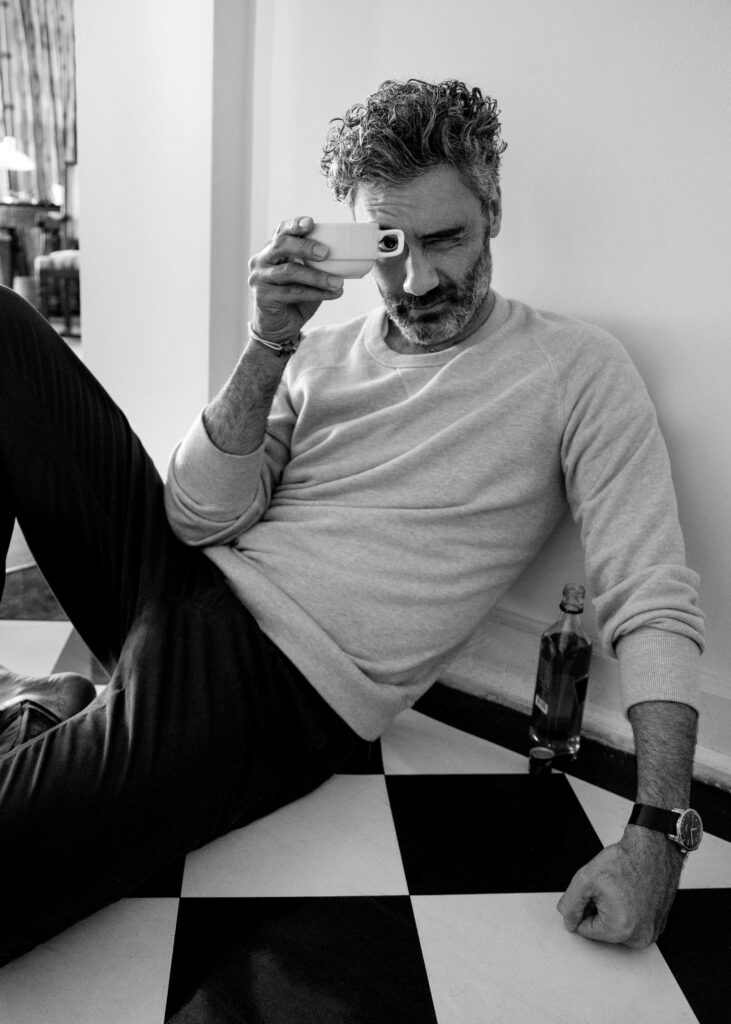Taika Waititi’s flight stick is shaking. The onboard computer is repeating, “Stall imminent! Stall imminent!” Will this next project save his career from spiraling into the ocean?
Genre: Drama/Sci-Fi
Premise: A young female robot becomes a companion for a sick rich girl who is trying to navigate her increasingly difficult life.
About: Taika Waititi just signed on to direct the adaptation of this book, which was written by Kazuo Ishiguro, who wrote Never Let Me Go and The Remains of the Day.
Writer: Kazuo Ishiguro
Details: About 450 pages

I could speak for days about Taika and Star Wars.
Okay, screw it. I’m going to get it all out here. The thing I hate so much about Kathleen Kennedy is that she insists that everything is fine when it’s clearly not. She’s the ‘house burning down everything-is-okay’ meme in real life.
She tells us that Taika’s Star Wars movie is still happening when it’s CLEARLY not. The guy has signed onto three different movies now since the Star Wars announcement. Just be honest with us. Tell us it’s been canceled. Stop living on Da Nile River with your Rian Johnson canoe and your Patty Jenkins gambling boat. The movies are dead.
And you know what? Thank God for Taika that they are. Because Taika’s career is in flux right now. Love and Thunder was a disaster. Our Flag Means Death was made for Twitter points. Nobody cares about Next Goal Wins.
He needs his next movie to be a hit and Star Wars is starting to look like a cursed franchise as long as Kennedy is in charge.
So good for Taika for escaping the Sarlac Pitt. And better for Taika to choose Klara and The Sun. Because Klara and The Sun very well might be the best thing I read all year.
13 year old Klara is an “artificial friend.” Or, to put it in today’s terms, an AI robot. But unlike a lot of robots, Klara is more perceptive than others. And when a 14 year old girl named Josie comes to the store and zeroes in on her, Klara is convinced that she’s found her match. This girl is pure kindness. Klara was meant to be Josie’s lifelong friend.
Josie’s mother buys Klara and they head back to their remote upscale home. We learn very quickly that Josie is sick. Every day, she gets a little bit weaker. However, the addition of Klara in her life is making the sickness more bearable. Josie is candy-apple sweet and Klara will do anything to keep her that way.
Soon after, we meet Rick, Josie’s neighbor. Rick is a nerdy middle-class weird kid, the kind of kid that upscale families like Josie’s don’t mix with. But Josie and Rick are so close that Josie’s mom tolerates him. Josie brings Klara into her special friendship with Rick and the three become the most offbeat trio ever.
As Josie’s health worsens, reality sets in, and Klara senses that the mother is preparing for the worst. But the worst is different from what Klara, and we, thought it was. It turns out Mother had a plan all along for her daughter’s doomed future, and Klara is going to figure into that quite prominently.

I want you to imagine something for me.
Remember that movie, “A.I.”, directed by Steven Spielberg? Okay, now imagine if that movie was actually good.
That’s Klara and the Sun.
One of the ways I determine good writing – which I encounter less and less these days – is by asking if I could’ve written the story. Given enough time, could I have approximated what the writer did here? For 98% of the Black List scripts, that answer is yes. And for most spec sales, same thing. I could’ve written something equivalent.
But that wasn’t anywhere close to the truth here. Kazuo Ishiguro writes in a way that scares other writers. He writes in a way where you think, even if I came up with my best concept, and I conceived of my best characters, and every day I wrote was a charmed day, I could never come up with anything close to this.
This guy is writing on another level. I spent half my reading enraptured by the story and the other half marveling at Ishiguro.
I usually have a good sense of how the writer is coming up with their approach to the story. But I was at a loss while reading Klara and the Sun. I guess I understood, in some ways, the broad strokes of what Ishiguro was doing. But I could never grasp the reasons he was making the choices he was making.
For example, there’s a chapter in the book where Klara has to attend a party for other teenagers her age. I guess, in the future, a lot more people are homeschooled, especially the smart ones, and so in order to socialize them before they go off to college they create these meetings, where the kids meet up so that they know how to interact with other people.
The chapter was tense and uncomfortable, and contained a couple of memorable moments, as the kids endured an accelerated obstacle course into high school politics. But I couldn’t figure out what the chapter had to do with the larger story. As it turned out, it didn’t really have much purpose at all.
And yet, I couldn’t imagine the book without it. It provided context to the story in a unique way, sort of like how, when you’re looking at a painting, you’re taking everything in at once, as opposed to understanding each individual piece of the puzzle. I could see everything – the whole story – in each of Ishiguro’s chapters. It was nothing like what I’m used to seeing in my daily script readings, where you see all the little strips of Matrix code the writer is clumsily stringing together to write the story he thinks he’s supposed to write.
I know what some of you are thinking.
Cancer.
And Kid.
Cancer Kid.
I was thinking the same thing. As soon as I saw, “cancer kid,” I groaned. I have long insisted that there’s no way to write about cancer kids that works. It’s just too freaking sad. And people don’t go to movies to be bummed out. They just don’t.
So that’s where my head was at first. I would read every five pages skeptically, ready to bail at the first red flag. But like any good story, each five pages was better than the previous five pages. Ishiguro knew how to keep us there.
For example, we start the story with Klara in the store, waiting to be bought. There’s a lot of exposition and world-building Ishiguro has to set up before the story begins. So what he wisely does is he brings Josie into the store early on. Josie immediately falls in love with Klara and Klara her. Josie says, I want to buy you. I’ll come back for you, I promise. And then she leaves.
As each day goes by, we wonder, where the heck is Josie???
What this does is it creates suspense. As Ishiguro continues to set up this world, we continue reading because WE WANT TO SEE IF JOSIE COMES BACK FOR KLARA. It’s a small thing but it’s a device that all good writers use. Cause they know that if a reader is going to quit on a book, it’s most likely going to happen early. So they have to give you a reason to keep reading during those early pages.
From there, the story is simple. Josie is sick. We don’t know how sick, which keeps us curiously turning the pages. And then Klara cares only about keeping Josie happy. Klara is different from the other AFs in that she will disobey an order if she thinks it will make Josie unhappy. All the other robots have to follow orders. She does not. So it creates a special bond between them and we become fully invested in that bond.
In fact, I was more worried about how Klara would take Josie’s death than Josie dying. Cause I knew Josie was Klara’s everything. So what happens when she’s no longer around? Does she lose all purpose? And would the family just throw her away? But don’t think you know where this story is going. Another great thing about Klara and the Sun is that it has its share of twists and turns.
On top of all that, it’s one of the most fascinating character studies I’ve ever read. Since we’re in Klara’s POV, we’re basically learning how to be a human in real time. Everything that Klara experiences is a first-time experience. And because she’s so ignorant to it all, it highlights the complexities of being human from an angle we haven’t seen before.
For example, Klara will do anything for Josie. But then Josie’s mom takes Klara out for the day and makes her do something really weird. She then tells Klara that she cannot, under any circumstances, tell Josie about what Klara and the mom did. For Klara, she can’t comprehend this – lying to Josie. It doesn’t compute. But she understands that if she loses the mom’s trust, she could be booted from the family and no longer have access to Josie. So what does she do? There is no correct choice.
There are a lot of moments like this that we, as humans, learn to navigate over time. But Klara learns all of them at once. And it’s interesting to see how she tackles these challenges.
This is going to be an amazing movie. I have zero doubt about that. It’s going to be up for multiple Oscars. And it could be Taika’s opus. Even better than JoJo Rabbit.
[ ] What the hell did I just read?
[ ] wasn’t for me
[ ] worth the read
[x] impressive
[ ] genius
What I learned: I used to think you couldn’t touch kid cancer. But this book has made me rethink that position, and the position of handling difficult subject matter in general. What I’ve learned is that you can cover kid cancer if you don’t dwell on how depressing it is. The thing about this book is that, although Josie is dying, the story mostly focuses on her positivity and her happy moments, as well as her perseverance. Only occasionally do we delve into her pain. And, even then, Ishiguro covers it with a neutral brush. He doesn’t dwell on the pain and sadness.
For example, there’s a chapter where Josie has been wanting to go to a waterfall but her mother will only allow her to do so if she rests up and gets well. So Josie fakes being well so she can go on the trip. Halfway there, her mom figures out what’s up, and they get into an argument about it. This is, technically, a depressing scene. Josie’s health deteriorates to a point where she’s so weak, she can’t even walk. But that’s not the chapter. The chapter focuses on the mom being upset that Josie wasn’t honest with her. Ishiguro consistently skates around any truly depressing moments. He, instead, finds a way to dramatize them or talk around them. I swear to you – this is a movie about kid cancer and, yet, it never feels depressing. I did not know that was possible.

